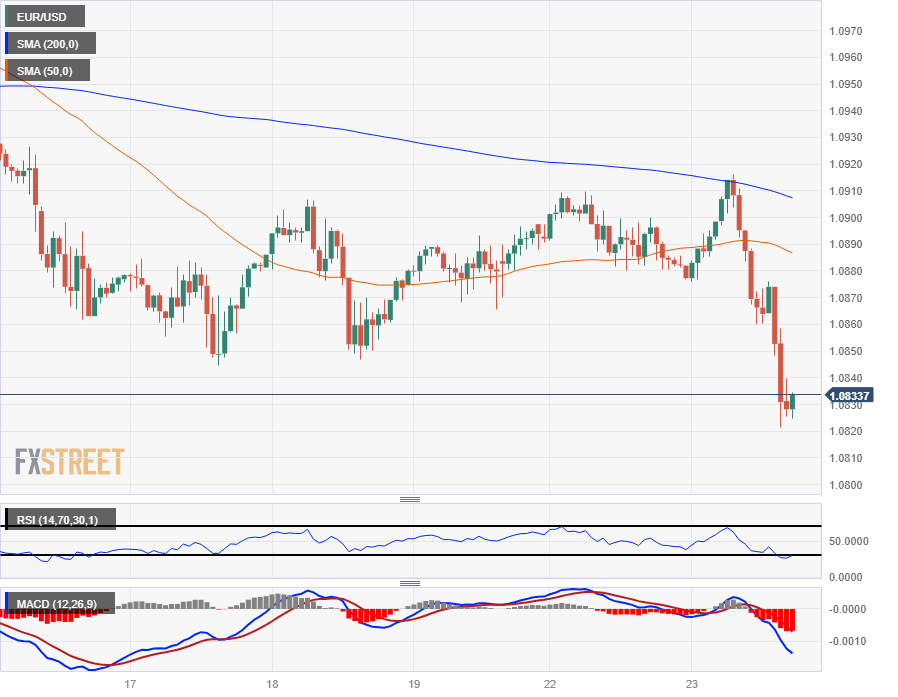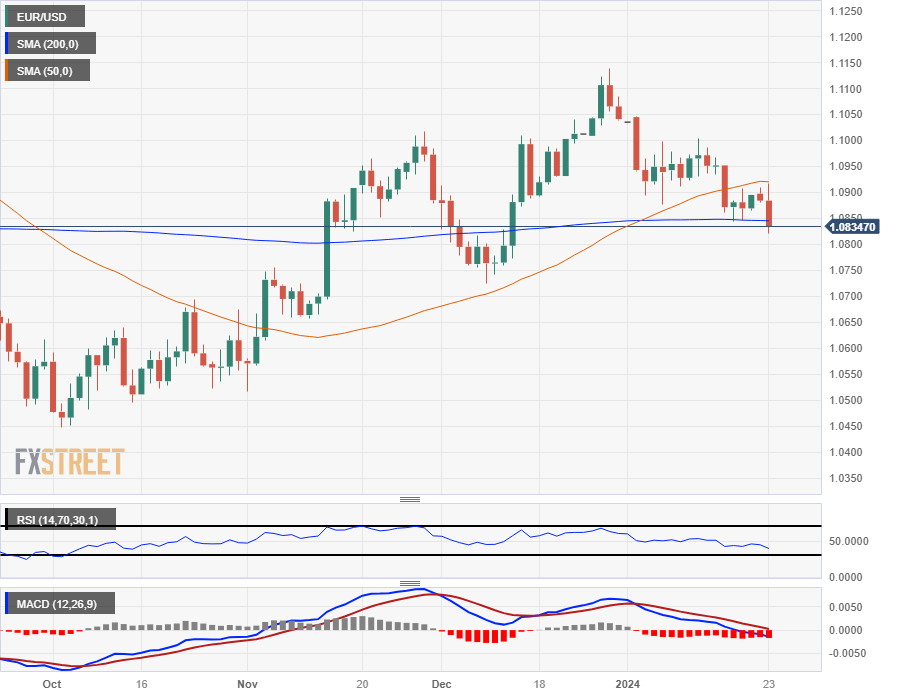- Phân tích
- Tin tức và các công cụ
- Tin tức thị trường
- EUR/USD plunges to new 2024 lows as Consumer Confidence metrics sour
EUR/USD plunges to new 2024 lows as Consumer Confidence metrics sour
- EUR/USD declines into five-week lows as safe haven flows pick up the Greenback.
- PMI figures from both the EU and the US due on Wednesday.
- ECB rate call to take center stage on Thursday, US PCE inflation on Friday.
The EUR/USD tumbled into fresh lows for 2024, hitting its lowest bids in nearly six weeks after the Euro extended broad-market declines on the back of souring consumer sentiment and declining bank lending activity confirmed by the latest Bank Lending Survey from the European Central Bank (ECB).
Europe saw extended declines in the Euro (EUR) after the ECB confirmed that business and lending activity in the euro area continued to decline. High interest rates exacerbated overall declines in bank lending activity across the continent, and European banks further tightened lending conditions through the fourth quarter of 2023.
Daily digest market movers: EUR/USD backslides as bad data releases pile up
- The European Consumer Sentiment Index declined to -16.1 in January versus the forecast rebound from December’s -15.0 to .14.3.
- The US Richmond Fed Manufacturing Index also declined to its lowest level in nearly four years in January, printing at -15 compared to December’s -11 and missing the market’s forecast recovery to -7.
- The ECB’s latest Bank Lending Survey showed bank lending activity declined further in the fourth quarter, with high interest rates and souring consumer sentiment specifically highlighted as key triggers.
- The ECB noted that European banks have broadly tightened lending conditions, squeezing credit access that has already seen slumping demand.
- Overall loan demand from both businesses and households is expected to decline further in 2024’s first quarter.
- Lending activity declines slowed in the fourth quarter, but continue to slowdown, exacerbating declines in economic activity.
- Wednesday brings Purchasing Managers’ Index (PMI) figures for both the euro area and the US.
- Markets are hoping the pan-European HCOB Composite PMI sees a slim gain from 47.6 to 48.0.
- The euro area’s Composite PMI has been in sub-50.0 contraction territory since July.
- US Services PMI is expected to decline slightly from 51.4 to 51.0.
- ECB descends on markets with its latest rate call on Thursday.
- Market expectations of steep and dep rate cuts from the ECB have been pushed back by central bank officials constantly warning that market hopes for rate cuts have run too far ahead of what policymakers can deliver.
Euro price today
The table below shows the percentage change of Euro (EUR) against listed major currencies today. Euro was the weakest against the US Dollar.
| USD | EUR | GBP | CAD | AUD | JPY | NZD | CHF | |
| USD | 0.39% | 0.40% | 0.06% | 0.16% | 0.28% | 0.12% | 0.24% | |
| EUR | -0.40% | 0.01% | -0.34% | -0.23% | -0.12% | -0.27% | -0.15% | |
| GBP | -0.40% | -0.01% | -0.35% | -0.21% | -0.14% | -0.27% | -0.17% | |
| CAD | -0.08% | 0.32% | 0.33% | 0.09% | 0.19% | 0.04% | 0.16% | |
| AUD | -0.21% | 0.19% | 0.19% | -0.16% | 0.06% | -0.06% | 0.04% | |
| JPY | -0.28% | 0.11% | 0.12% | -0.21% | -0.07% | -0.13% | -0.03% | |
| NZD | -0.11% | 0.29% | 0.27% | -0.08% | 0.06% | 0.17% | 0.10% | |
| CHF | -0.26% | 0.14% | 0.16% | -0.19% | -0.04% | 0.03% | -0.11% |
The heat map shows percentage changes of major currencies against each other. The base currency is picked from the left column, while the quote currency is picked from the top row. For example, if you pick the Euro from the left column and move along the horizontal line to the Japanese Yen, the percentage change displayed in the box will represent EUR (base)/JPY (quote).
Technical Analysis: EUR/USD gets knocked back sharply from 1.0900 once again
The EUR/USD fell below the 1.0900 handle on Tuesday for the third time in less than a week after the pair saw a sharp rejection from the 200-hour Simple Moving Average (SMA) near 1.0915, shedding over eight-tenths of a percent top-to-bottom.
Tuesday’s decline sees the EUR/USD pair taking a bear run into the 200-day SMA after falling away from the 50-day SMA near 1.0920. EUR/USD intraday volatility sees the pair in rough consolidation trading between the 50-day and 200-day SMAs, and an extended decline will see the pair making a run at the last swing low near 1.0750.
EUR/USD Hourly Chart
EUR/USD Daily Chart
Euro FAQs
What is the Euro?
The Euro is the currency for the 20 European Union countries that belong to the Eurozone. It is the second most heavily traded currency in the world behind the US Dollar. In 2022, it accounted for 31% of all foreign exchange transactions, with an average daily turnover of over $2.2 trillion a day.
EUR/USD is the most heavily traded currency pair in the world, accounting for an estimated 30% off all transactions, followed by EUR/JPY (4%), EUR/GBP (3%) and EUR/AUD (2%).
What is the ECB and how does it impact the Euro?
The European Central Bank (ECB) in Frankfurt, Germany, is the reserve bank for the Eurozone. The ECB sets interest rates and manages monetary policy.
The ECB’s primary mandate is to maintain price stability, which means either controlling inflation or stimulating growth. Its primary tool is the raising or lowering of interest rates. Relatively high interest rates – or the expectation of higher rates – will usually benefit the Euro and vice versa.
The ECB Governing Council makes monetary policy decisions at meetings held eight times a year. Decisions are made by heads of the Eurozone national banks and six permanent members, including the President of the ECB, Christine Lagarde.
How does inflation data impact the value of the Euro?
Eurozone inflation data, measured by the Harmonized Index of Consumer Prices (HICP), is an important econometric for the Euro. If inflation rises more than expected, especially if above the ECB’s 2% target, it obliges the ECB to raise interest rates to bring it back under control.
Relatively high interest rates compared to its counterparts will usually benefit the Euro, as it makes the region more attractive as a place for global investors to park their money.
How does economic data influence the value of the Euro?
Data releases gauge the health of the economy and can impact on the Euro. Indicators such as GDP, Manufacturing and Services PMIs, employment, and consumer sentiment surveys can all influence the direction of the single currency.
A strong economy is good for the Euro. Not only does it attract more foreign investment but it may encourage the ECB to put up interest rates, which will directly strengthen the Euro. Otherwise, if economic data is weak, the Euro is likely to fall.
Economic data for the four largest economies in the euro area (Germany, France, Italy and Spain) are especially significant, as they account for 75% of the Eurozone’s economy.
How does the Trade Balance impact the Euro?
Another significant data release for the Euro is the Trade Balance. This indicator measures the difference between what a country earns from its exports and what it spends on imports over a given period.
If a country produces highly sought after exports then its currency will gain in value purely from the extra demand created from foreign buyers seeking to purchase these goods. Therefore, a positive net Trade Balance strengthens a currency and vice versa for a negative balance.
© 2000-2026. Bản quyền Teletrade.
Trang web này được quản lý bởi Teletrade D.J. LLC 2351 LLC 2022 (Euro House, Richmond Hill Road, Kingstown, VC0100, St. Vincent and the Grenadines).
Thông tin trên trang web không phải là cơ sở để đưa ra quyết định đầu tư và chỉ được cung cấp cho mục đích làm quen.
Giao dịch trên thị trường tài chính (đặc biệt là giao dịch sử dụng các công cụ biên) mở ra những cơ hội lớn và tạo điều kiện cho các nhà đầu tư sẵn sàng mạo hiểm để thu lợi nhuận, tuy nhiên nó mang trong mình nguy cơ rủi ro khá cao. Chính vì vậy trước khi tiến hành giao dịch cần phải xem xét mọi mặt vấn đề chấp nhận tiến hành giao dịch cụ thể xét theo quan điểm của nguồn lực tài chính sẵn có và mức độ am hiểu thị trường tài chính.
Sử dụng thông tin: sử dụng toàn bộ hay riêng biệt các dữ liệu trên trang web của công ty TeleTrade như một nguồn cung cấp thông tin nhất định. Việc sử dụng tư liệu từ trang web cần kèm theo liên kết đến trang teletrade.vn. Việc tự động thu thập số liệu cũng như thông tin từ trang web TeleTrade đều không được phép.
Xin vui lòng liên hệ với pr@teletrade.global nếu có câu hỏi.















